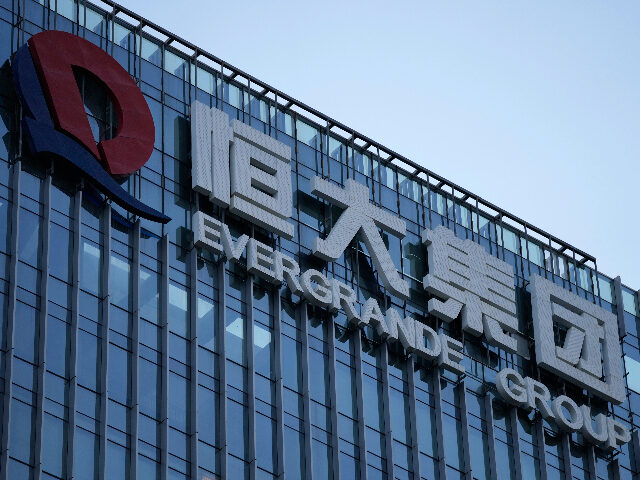The Hong Kong Stock Exchange posted a notice on Thursday that trading had been suspended for shares of China Evergrande Group, the gigantic and dangerously indebted property developer whose potential collapse is being watched nervously by economists worldwide.
“Shares of Evergrande closed at 32 Hong Kong cents on Wednesday,” the Associated Press (AP) reported. “The company had resumed trading on Aug. 28 after a 17-month hiatus. Trading in two other units, China Evergrande New Energy Vehicle Group and Evergrande Property Services Group, was also halted Thursday.”
The South China Morning Post (SCMP) found the entire Hong Kong market “jittery” as the Evergrande crisis took another turn for the worse. Overseas interest in Chinese stocks overall is fading, leading to one of the biggest one-month selloffs in the history of the Hong Kong market in August.
On Thursday night, the China Evergrande Group revealed that its founder, Hui Ka Yan, had been placed under “mandatory measures in accordance with the law due to suspicion of crimes.”
Hui was reportedly placed under “residential surveillance” this month without a public announcement. His passport was confiscated, he was forced to remain at a location other than his home, and his co-workers have been unable to communicate with him.
According to China’s state-run Global Times, several employees of a wealth management unit within the Evergrande Group had also been “placed under a criminal probe, signaling that China was strengthening its approach to counter issues facing the domestic property market.”
Chinese officials have not stated the charges against Hui or any of his employees.
The SCMP worried on Thursday that Evergrande might be the tip of a debt iceberg big enough to wreck the entire Chinese financial system:
China’s banks have seen an influx of bad assets in their once-thriving property-loan business, and more could be reported amid the restructuring of Evergrande and other struggling developers.
The outstanding property-related non-performing loans (NPLs) of China’s top banks saw an annual increase in value of 37 per cent to 291 billion yuan (US$40 billion) from July 2022 to the end of June this year, according to the Post’s calculations of their midyear financial reports.
Two-thirds of the banks have seen an increase in their property NPL ratio, signaling that they are still troubled by China’s ongoing property crisis.
The SCMP took a close look at 18 of the 20 banks deemed “systemically important” by the central bank and found them stuffed with bad paper, including the banks directly controlled by the Communist government. Four of those banks are also classified as “systemically important” by a global group called the Bank for International Settlements, a sort of consortium for national central banks.
In other words, a troubling percentage of both China’s and the world’s economy is perched upon the withered skeletons of non-performing property loans, and if those skeletons crumble to dust, the whole world is going to feel the resulting lurch.
Gavekal Dragonomics analyst Zhang Xiaoxi warned that the situation might be even worse than the grim picture painted by the SCMP’s review because regulatory changes were made during the Wuhan coronavirus pandemic that allowed banks to conceal some of their distressed loans. If the Evergrande crisis forces these banks to report more of their bad assets, investor jitters will become a lot worse, and confidence is essential to a robust financial system.
The SCMP discussed another big systemic problem with China’s finances on Thursday: local government financing vehicles (LGFVs), which are hybrid public-private entities to get around the normal regulatory limits on local government borrowing. The private partners in an LGFV magically transform it from a “government” entity into a “corporation” that can borrow much more money.
Chinese local governments have been using LGFVs to rack up staggering amounts of debt — so much debt accounted for in such a haphazard manner that no one really knows exactly how big it is. The International Monetary Fund (IMF) believes China’s LGFV debt has doubled since 2017, reaching about $9 trillion in 2023 — and that does not include the “hidden debt” LGFVs tend to accumulate by loaning money to government officials off the books.
The big problem is that China’s local governments get most of their revenue from collecting property taxes and selling land-use rights, so the slowdown in the property market is choking off their income stream, potentially leaving local officials too cash-strapped to make the payments on their LGFV debts. If Evergrande, or the even bigger and equally imperiled Country Garden Holdings, come crashing down, they could detonate all those heavily indebted LGFVs like a string of financial firecrackers.

COMMENTS
Please let us know if you're having issues with commenting.